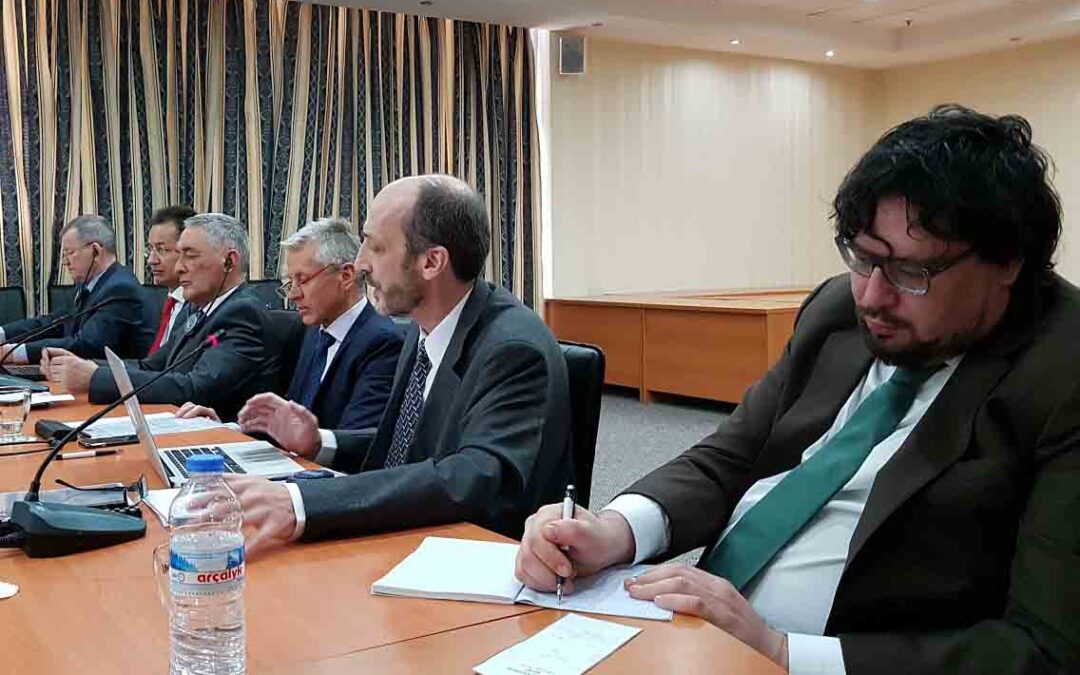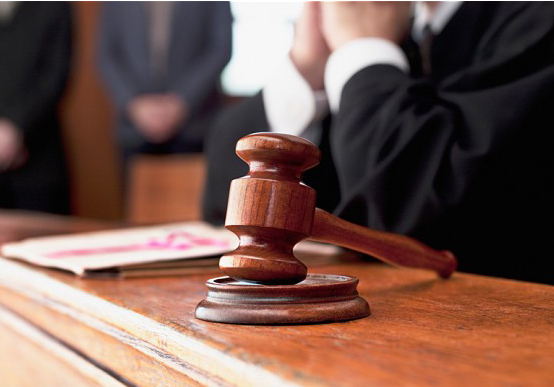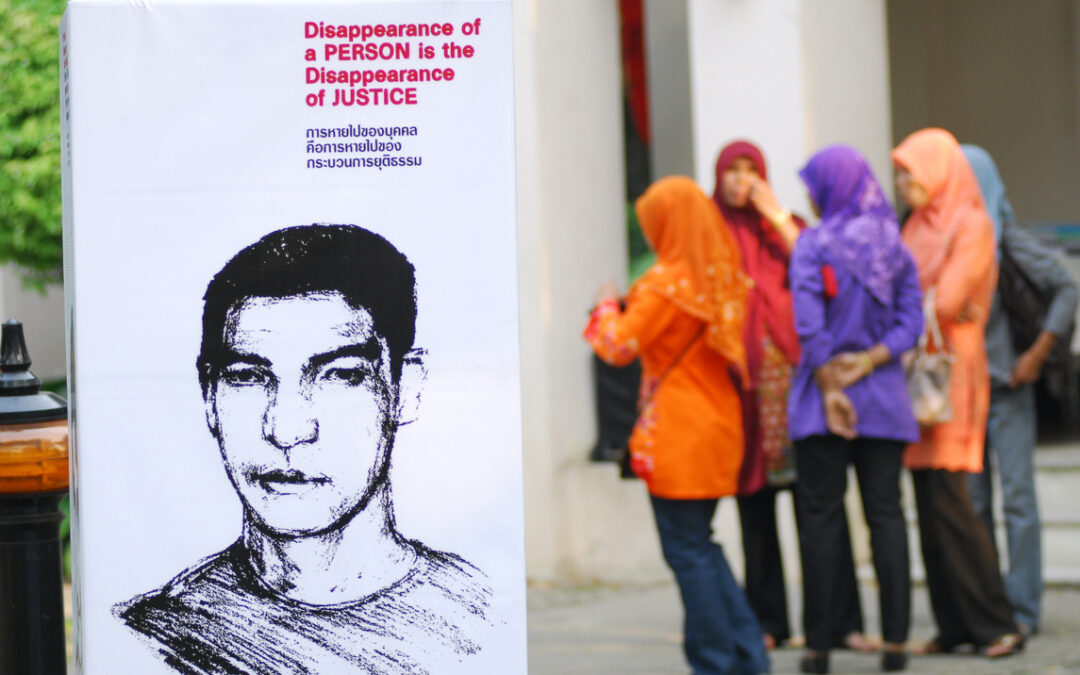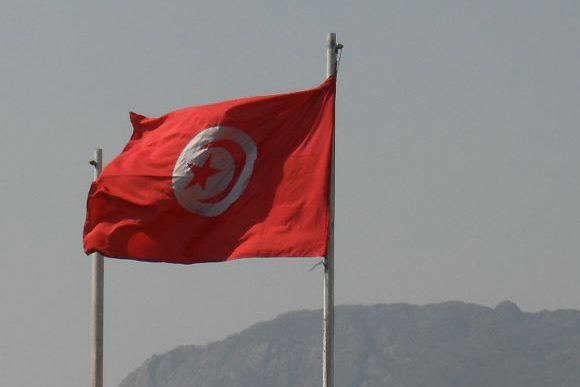
Feb 2, 2017 | News
Today, the ICJ in cooperation with the the Supreme Court of Turkmenistan holds a seminar on Comparative Approaches to Judicial Ethics.
The seminar, supported by the European Union, will be attended by judges of the Supreme Court of Turkmenistan as well as other judges.
ICJ experts, including Judge Vladimir Borissov, former judge of the Supreme Court of Kazakhstan, Judge Georg Stawa, the President of the European Commission for the Efficiency of Justice (CEPEJ), and others will present comparative perspective and international standards related to the judicial ethics, accountability and guarantees for judges.
This is the second such event the ICJ holds in Turkmenistan. The first event, organized in June 2016, was dedicated to the issue of international obligations in national courts.
Turkmenistan-Judicial ethics seminar-News-web story-2017-RUS (full story in Russian, PDF)
Turkmenistan-Seminar Ethics-Agenda-2017-ENG (agenda in English, PDF)
Turkmenistan-Seminar Ethics-Agenda-2017-RUS (agenda in Russian, PDF)

Jan 19, 2017 | News
The Sri Lankan government must deliver on the clear demand for justice from Sri Lankans nationwide by implementing the Consultation Task Force recommendations without further delay, the ICJ said today.
Among these recommendations, the calls for a special court with international judges and a bar against amnesties for crimes under international law are of particular importance, the ICJ added.
The Consultation Task Force on Reconciliation Mechanisms (CTF), a panel of 11 independent eminent persons appointed by Prime Minister Ranil Wickremesinghe in January 2016, publicly released its final report on 3 January 2017.
The report, reflecting the views of people across the country gathered through island-wide public consultations on transitional justice, highlights the lack of public confidence in the justice system’s capacity and will to deliver justice for victims of Sri Lanka’s nearly 30-year armed conflict that ended in 2009.
“The CTF report highlights a widespread lack of trust among Sri Lankans across the country, regardless of region, ethnicity, religion or language, in the ability of the criminal justice system in its current form to address serious human rights abuses stemming from the conflict,” said Nikhil Narayan, the ICJ’s South Asia senior legal adviser.
The report also calls upon the Government of Sri Lanka to take necessary steps to ensure a credible transitional justice process in line with the October 2015 UN Human Rights Council resolution 30/1 that it co-sponsored.
“If the Sri Lankan government wants to restore public confidence in the system, it must seriously consider victims’ voices and implement the CTF recommendations on truth, justice and reparation consistent with the commitments it voluntary undertook at the Human Rights Council,” Narayan added.
Importantly, the CTF report reiterates the commitments pledged in HRC resolution 30/1, calling for active international participation in a special judicial mechanism established to deal with accountability for human rights abuses committed during the conflict by both sides, and for a bar against amnesties for international crimes.
According to the ICJ, the Sri Lankan government took an important first step towards reconciliation when it adopted the UN resolution and later established the CTF to carry out public consultations to hear a cross section of voices on transitional justice.
“Unfortunately, since then, it has been disappointing in its lack of urgency in implementing much of those stated promises and in its apparent disregard for the CTF recommendations,” Narayan said.
Several members of the government have dismissed the CTF’s recommendations, especially with regard to the inclusion of at least one international judge on every bench of the special judicial mechanism.
The Minister of Foreign Affairs recently spoke of the need for “an independent and credible domestic mechanism” without alluding to any international participation, as has been reiterated by those seeking redress as a crucial element to ensure faith in the justice mechanism.
The ICJ has in the past highlighted Sri Lanka’s culture of impunity in the justice system looking at a number of emblematic cases, and called into question the State’s capacity and political will to use the criminal justice system and other ad-hoc measures to deliver justice and accountability to victims and survivors of serious human rights abuses.
“As the situation of Sri Lanka comes before the UN Human Rights Council again this March, the Sri Lankan government is in a position to demonstrate both to the UN Member States but more importantly to its own people at home its seriousness in pursuing truth, justice, reparation and non-recurrence for conflict victims who have been waiting for justice for decades. It must seize this opportunity before it is one more of many missed opportunities,” Narayan added.
Contact:
Nikhil Narayan, ICJ South Asia senior legal adviser, t: +91-8939325204 (Chennai); +94-758898067 (Sri Lanka); +1-562-261-3770 (Whatsapp) ; e: nikhil.narayan(a)icj.org
Download the full text with additional background info, in PDF:
Sri Lanka-CTF recommendations-News-Press release-2016-ENG

Dec 23, 2016
The ICJ today called on the Moroccan authorities to develop and adopt, in close consultation with the associations of judges, a Code of Ethics and Judicial Conduct that is fully consistent with international standards on judicial independence and accountability.
The statement came following a high-level mission to Morocco from 19 to 21 December 2016, during which the ICJ engaged with members of the Conseil supérieur du pouvoir judiciaire (CSPJ) and the judiciary on the reforms needed with a view to developing standards of conduct that are in line with the Bangalore Principles of Judicial Conduct and the UN Basic Principles on the Independence of the Judiciary.
The ICJ submitted to the Moroccan authorities and published a memo analyzing and formulating recommendations on the content of the Judicial Code of Ethics, the procedure of its adoption, the composition and functions of the Judicial Ethics Board, and the flaws in in the laws on the CSPJ and on the Statute for Judges regarding the disciplinary system.
“The development of a Judicial Code of Ethics that is consistent with international standards is an important opportunity to reinforce judicial independence and to ensure that the judiciary remain accountable to the public it serves,” said Said Benarbia, ICJ Director of the Middle East and North Africa Programme.
The ICJ is calling for the development of a Code that contain ethical duties that do not undermine a judge’s human rights and fundamental freedoms, including the right to the freedom of expression and association.
It is important not only for the judges themselves, but for the public at large, that the voices of judges are heard regarding in particular questions concerning the administration of justice.
The ICJ considers that the obligations contained in the Code must be precisely defined in order to give judges notice of the types of conduct they should undertake or abstain from.
This is particularly important given the vague and imprecise definitions of disciplinary offences as provided for by the law on the Statute for Judges.
The ICJ calls on the Moroccan authorities to review the provisions on disciplinary offences, including by ensuring that they do not unnecessarily restrict the enjoyment of fundamental freedoms by the Moroccan judges, and that they also include judicial violations of human rights and international humanitarian law, as well as offences of serious judicial corruption.
In the interim, The ICJ recommends that the Judicial Code of Ethics fill that gap by clearly specifying the types of conduct that may render judges liable to disciplinary sanctions.
Furthermore, while the law on the CSPJ provides that a Judicial Ethics Board is to be established to ensure that judges respect the obligations contained within the Judicial Code of Ethics, the ICJ is concerned that neither the composition nor the mandate of the Judicial Ethics Board are clearly specified.
The Moroccan authorities should ensure that the composition of the Judicial Ethics Board is clarified and that its functions are clearly defined, including by entrusting the Board with an advisory role.
“Ensuring that judges are able to consult the Board whenever they have questions regarding the proper application of the Judicial Code of Ethics would contribute to preventing improper conduct and thus reinforce the public’s confidence in its judiciary,” Benarbia added.
Contact:
Said Benarbia, Director of the ICJ Middle East and North Africa Programme, t: +41.22.979.3817, e: said.benarbia(a)icj.org
Additional information:
The ICJ delegation met with Mr. Mustapha Farès, First President of the Cassation Court; Mr. Mustapha Meddah, Prosecutor General of the Cassation Court; Mr Driss El Yazami, President of the National Council of Human Rights; Mr. Yassin Mokhli and Mrs Aicha Nassiri, elected members of the CSPJ; Mr. Mohamed Khadraoui, vice-President of the Amicale Hassania; and Mr Abdellatif Chentouf, President of the Judges’ Club.
Morocco-Code of Ethics-News-Press releases-ARA-2016 (full text in Arabic, PDF)
Morocco-Code of Ethics-Advocacy-Analysis Brief-2016-ENG (Memo in English, PDF)
Morocco-Code of Ethics-Advocacy-Analysis Brief-2016-ARA (Memo in Arabic, PDF)

Nov 19, 2016 | Advocacy
Ten years after the Comprehensive Peace Accord (CPA) ended Nepal’s bloody civil war, Nepali authorities must renew their commitment to ensure truth, justice and reparation for victims of the conflict who are still waiting for redress, the ICJ said today.
The CPA, signed by the Government of Nepal and the country’s major political parties, including the then Communist Party of Nepal (Maoist) on 21 November 2006, called for a credible transitional justice process that would ensure victims’ rights to truth, justice, reparation and effective remedy in accordance with Nepal’s international human rights obligations.
“The hope and promise to conflict victims towards fulfillment of their rights to truth, justice and reparation that came with the signing of the CPA and the end of the conflict ten years ago have yet to be realized,” said Sam Zarifi, ICJ Asia director.
“Over the last ten years, various governments from all the different parties have blocked or hindered the transitional justice process, ignoring rulings by the Supreme Court that demanded compliance with international law and standards,” he added.
The full statement can be downloaded here:
nepal-statement-cpa-anniversary-advocacy-2016-eng (full text in PDF)

Nov 9, 2016
The ICJ has called on the Tunisian authorities to adopt effective measures to ensure that the newly established Specialized Criminal Chambers (SCC) deliver meaningful justice for victims of human rights violations.
In a memorandum published today the ICJ stressed that the SCC had been given a critical role in holding all those responsible for such violations to account in line with international law and standards.
However, the ability for the SCCs to effectively fulfil that role would depend on the willingness of the Tunisian authorities to adopt a number of measures, as set out in recommendations contained in the memorandum.
The memorandum analyses the guarantees for the selection and appointment of the SCC judges; the SCC’s jurisdiction over gross human rights violations; and the legal and practical obstacles that may hinder the SCC’s capacity to deliver justice effectively.
The ICJ has recognized the importance of State initiatives to establish mechanisms and measures to address past human rights violations under the framework of “transitional justice”, such as the Instance Vérité et Dignité (IVD) in Tunisia.
“But mechanisms of this kind and particularly the SCC must not undermine justice and accountability and must be complementary to the ordinary justice system rather than a substitute for it,” said Said Benarbia, Director of the ICJ Middle East and North Africa Programme.
The ICJ stressed that for the SCC to be effective, the authorities need to act to clearly set out the procedures before the SCC; ensure that such procedures are consistent with international fair trial rights; establish specialized investigation and prosecution services; and provide for witness and victims protection units in line with international standards.
Obstacles potentially impeding accountability efforts in Tunisia include flawed definitions of crimes and of superior responsibility in the Criminal Code; the application of limitation periods in cases of serious human violations, and uncertainty over whether victims have direct access to lodge complaints before the SCC.
The ICJ identified measures for adoption by the Tunisian authorities to eliminate these obstacles and to ensure the effective functioning of the SCC. These steps include:
- introducing a clear framework regulating the mandate of the SCC and their relation with the ordinary justice system institutions and the IVD;
- ensuring that all alleged human rights violations are investigated and prosecuted, including allegations that are not transferred by or submitted to the IVD;
- ensuring that impunity for gross human rights violations is not facilitated by the application of limitation periods;
- ensuring that Tunisian laws are not construed to allow an individual responsible for a gross human rights violation to rely on an order received from a superior officer or public authority to escape criminal responsibility; and
- ensuring that the SCC contribute to the full realization of the victims’ right to effective, prompt remedy and reparation in all its forms recognized under international law.
Contact
Theo Boutruche, Legal Adviser of the ICJ Middle East and North Africa Programme, tel: +96 170 888 961, e-mail: theo.boutruche(a)icj.org
tunisia-scc-memo-news-press-releases-2016-ara (full story in Arabic, PDF)
tunisia-memo-on-scc-advocacy-analysis-brief-2016-eng (full memo in English, PDF)
tunisia-memo-on-scc-advocacy-analysis-brief-2016-ara (full memo in Arabic, PDF)









